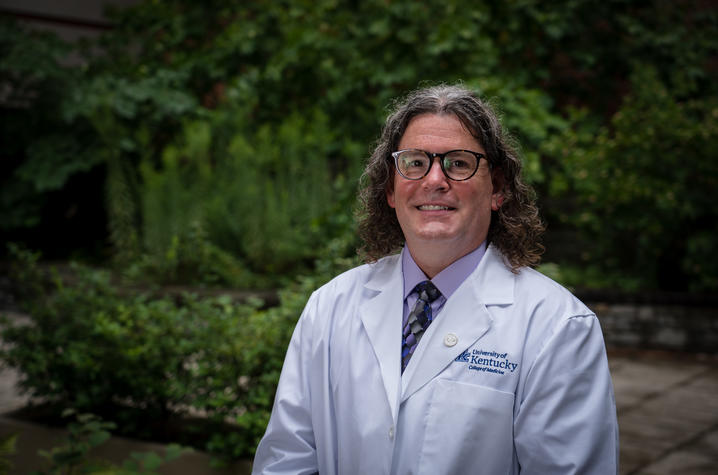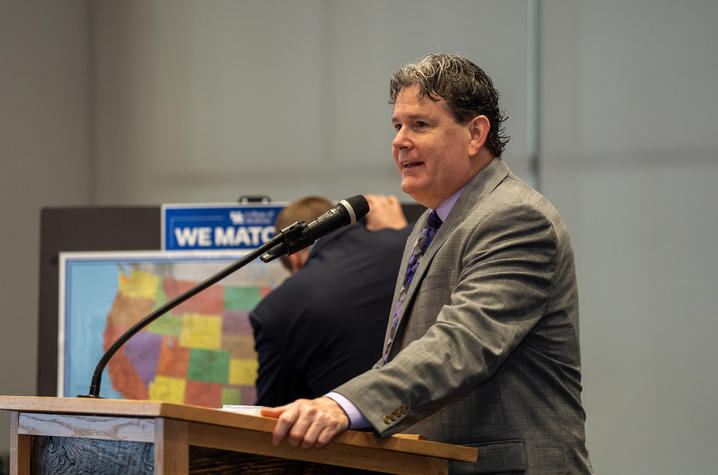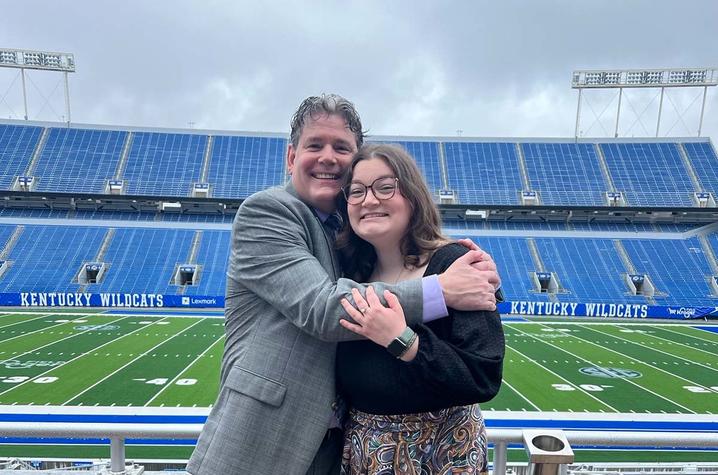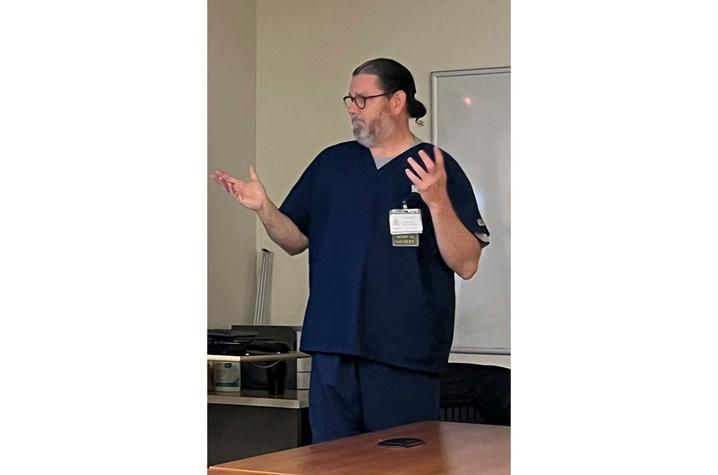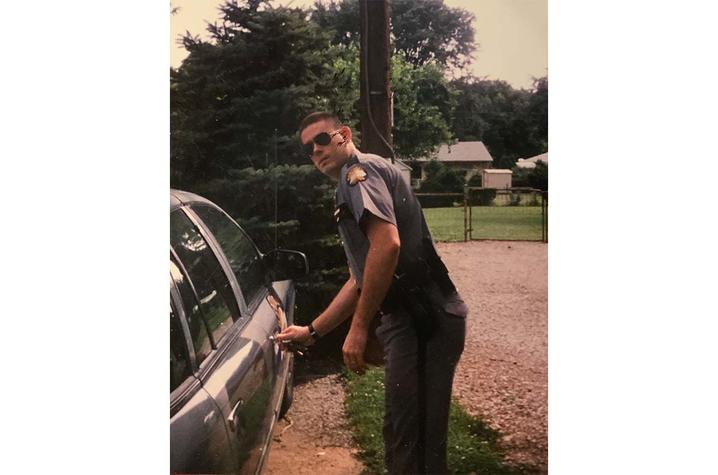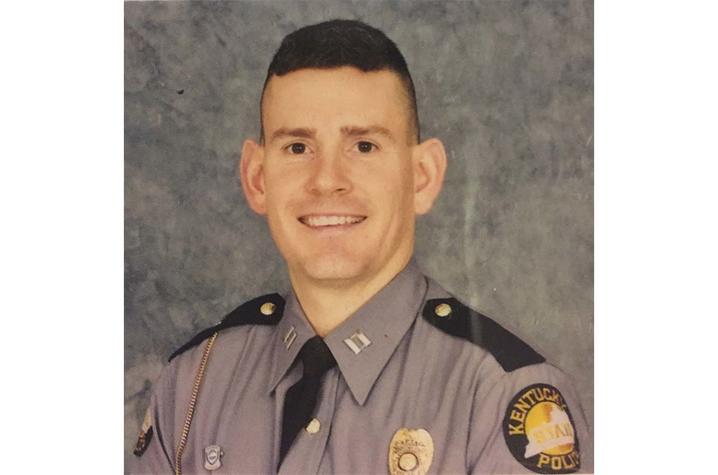Chasing childhood dreams, retired state trooper to graduate with medical degree
LEXINGTON, Ky. (May 8, 2024) – When John “JB” Bradley was a young boy growing up in Beattyville, Kentucky, he dreamed of being a doctor. Inspired by his small town’s family physician, he imagined taking care of families just like his own one day.
With graduation just days away, Bradley is one step closer to actualizing that dream. He describes his journey to this moment as long, winding and certainly not without challenges.
He enrolled at the University of Kentucky for the first time in 1988, intending to major in biology before attending medical school. Though Bradley excelled his first semester, he quickly realized he needed to mature and develop better academic habits to make his dream come true. Without completing his degree, he left the university and landed a job at a nearby lab, putting his short-lived science training to use.
After leaving UK in the late 1980s, Bradley would go on to get married, have children and lead an impressive, decades-long career as a public servant. Throughout his life, he strived to be a role model for his children to chase their dreams and, ultimately, to give back to the place and community that raised him.
A public servant
Feeling unfulfilled after a few years at the lab, Bradley reconsidered his childhood dream of helping others. Aside from the town doctor, Bradley sought early inspiration from another prominent community figure – his uncle, a Kentucky State Police (KSP) trooper. Bradley was always enamored by the sight of his uncle, dressed head-to-toe in uniform, stepping out of his police cruiser.
“Against the advice of almost everyone in my life, including my parents, my friends, and, most loudly, the people at work, I put in an application to be a Kentucky State Police trooper,” said Bradley. He started basic training with the Kentucky State Police Academy in February 1996, remarking that his 22-week training coincidentally began on “the coldest day of the year.” For 21 years, Bradley advanced through the ranks and served Kentucky as a member of law enforcement.
“The KSP phase of my life changed me fundamentally. As an officer, I gained confidence, technical know-how, practical know-how,” he said. “But most importantly, with regard to my medical career, I gained a real understanding of people in crisis – what they need, how they should be talked to – it really honed my communication skills.”
Bradley lamented never finishing his degree and pledged to go back to school. He had also become a father and wanted to set an example for his two teenage children, so he enrolled at Kentucky State University to study criminal justice in 2016.
A dream, once deferred
“I understood what was at stake and how important it was to not squander that opportunity,” Bradley said. Unlike his first attempt at college, Bradley was older, more mature and steadfast in his commitment to success.
Bradley retired from the KSP in 2017 with a full pension. After just three months of retirement, however, he couldn’t shake the feeling that he had more to do. He returned to Kentucky State University once again – this time to finish his biology degree.
In 2019, he graduated as class valedictorian.
“At this point, I had driven by the UK hospital in Lexington for over 30 years and, every time, I would think to myself, they are doing wonderful things in there, learning, using cutting-edge technology,” Bradley said. “They're doing the things that you've always wanted to do.
“I didn't have the dedication to do it way back when, but what about now?”
At age 50, he decided to find out. Bradley spent months studying for the MCAT and applied to only one school: the UK College of Medicine.
“I remember getting a call from Dr. (Michael) Rankin letting me know that I had been accepted. Other than my two children being born, it was the happiest day of my life,” said Bradley.
According to the American Association of Medical Colleges (AAMC), only about 0.3% of medical students are over the age of 40. Bradley admits being nervous to meet his classmates, noting he was nearly double their age. He wondered if he would fit it in. Within the first hour of orientation, those anxieties melted away. Bradley fondly recalls the diversity of his incoming class and described how their shared purpose of becoming physicians overshadowed any differences they may have had.
“Medical school wasn’t all rainbows and sunshine though. There were some dark moments during my journey where I questioned if I had made a mistake,” Bradley said. “I can truly say I did not truly appreciate all of the late nights and hard work, my accomplishments and what my future would look like, until Match Day.”
Standing beside his daughter, Cali, who is currently a junior at Transylvania University and studying for the MCAT herself, Bradley opened the envelope that fateful Friday in March to reveal he would be staying at the University of Kentucky for residency training in pathology.
As a police officer, and later investigative lieutenant, Bradley was no stranger to the work of pathologists. He had visited the state medical examiner’s lab in Frankfort many times throughout his career. During his fourth year of med school, he returned to the lab for a pathology elective. He found the discipline of pathology combined everything he was looking for in both a program and a lifestyle.
Bradley credits then-associate dean for student affairs, Michelle Lineberry, Ed.D., for connecting him with Robert McDonald, D.O., director of the pathology residency program and advanced development director for the department, who helped him learn even more about pathology over the past year.
“Dr. McDonald welcomed me and showed me other aspects of pathology that I had not been exposed to, like surgical pathology. He enabled me to meet with other faculty, too, which made me realize what an excellent way this would be to leverage my 21 years of police experience and have some continuity in my medical career,” Bradley said.
A home in Kentucky
“I knew I had found my home once I did the interview,” he said. “I had great residency interviews everywhere, but the pathology department here stood out. Every person I met, I felt like I was sitting and talking with an old friend.”
Bradley also credits Department of Pediatrics Assistant Professor Michael Kuduk, M.D., for his successes during school. During moments of personal strife, Bradley was able to turn to Dr. Kuduk for guidance and encouragement. “I was going through the most difficult personal challenges of my life, and it just happened to be at the same time as my most rigorous professional challenge yet — my primary internship,” recalled Bradley. “Dr. Kuduk was there to shepherd me through both.”
Kuduk will also be the one to hood Bradley at the upcoming commencement ceremony, a gesture representing their strong bond formed over the last four years.
“Ten years from now I intend to be right here in Lexington, practicing as a pathologist and continuing to do what I've done since 1996, which is, in some form or fashion, providing my service to the people that I grew up with here in Kentucky,” Bradley said. “Kentucky is my home, I've lived here for 53 years. I know what this hospital means to Kentucky. I know what this University means to Kentucky. And I intend to be part of that for as long as I can.”
Bradley will graduate on Saturday, May 11, at 1:30 p.m. EDT, alongside 194 classmates from all four College of Medicine campuses. Commencement ceremonies will take place at the University of Kentucky Singletary Center for the Arts.
As the state’s flagship, land-grant institution, the University of Kentucky exists to advance the Commonwealth. We do that by preparing the next generation of leaders — placing students at the heart of everything we do — and transforming the lives of Kentuckians through education, research and creative work, service and health care. We pride ourselves on being a catalyst for breakthroughs and a force for healing, a place where ingenuity unfolds. It's all made possible by our people — visionaries, disruptors and pioneers — who make up 200 academic programs, a $476.5 million research and development enterprise and a world-class medical center, all on one campus.





